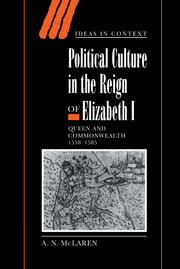Book contents
- Frontmatter
- Contents
- Acknowledgements
- Introduction
- 1 ‘To be Deborah’: the political implications of providentialism under a female ruler
- 2 Announcing the godly common weal: Knox, Aylmer and the parameters of counsel
- 3 Feats of incorporation: the ideological bases of the mixed monarchy
- 4 Contesting the social order: ‘resistance theory’ and the mixed monarchy
- 5 Godly men and nobles: the bicephalic body politic
- 6 Godly men and parliamentarians: the politics of counsel in the 1570s
- 7 Rewriting the common weal: Sir Thomas Smith and the De Republica Anglorum
- Afterword
- Bibliography
- Index
- IDEAS IN CONTEXT
1 - ‘To be Deborah’: the political implications of providentialism under a female ruler
Published online by Cambridge University Press: 06 August 2009
- Frontmatter
- Contents
- Acknowledgements
- Introduction
- 1 ‘To be Deborah’: the political implications of providentialism under a female ruler
- 2 Announcing the godly common weal: Knox, Aylmer and the parameters of counsel
- 3 Feats of incorporation: the ideological bases of the mixed monarchy
- 4 Contesting the social order: ‘resistance theory’ and the mixed monarchy
- 5 Godly men and nobles: the bicephalic body politic
- 6 Godly men and parliamentarians: the politics of counsel in the 1570s
- 7 Rewriting the common weal: Sir Thomas Smith and the De Republica Anglorum
- Afterword
- Bibliography
- Index
- IDEAS IN CONTEXT
Summary
Querative: if God should call her majesty leaving issue a daughter … what he thinketh of that Daughter's Right?
Elizabeth to John Knox (1559)THE DEBATE OVER HEADSHIP
In 1559 Elizabeth's query to John Knox was a telling one. The Henrician Reformation had problematised the relationship of the imperial king to the ‘church’ (now newly defined as both a universal and a purely English gathered congregation) in ways that also, inevitably, affected the perception and conduct of female rule. What exactly did it mean to be ‘Supreme Head of the Church of England next under Christ’? What powers did it entail? Did it necessarily – as many Protestants believed – derogate from Christ's authority? For Anthony Gilbey, writing in Geneva in 1558, before his return to England at Elizabeth's accession, Henry VIII's claim to be Supreme Head left an antichristian remnant in the Anglican Church that impeded further reformation:
This monstrous boar [Henry VIII] for all this must needs be called the Head of the Church in pain of treason, displacing Christ, our only Head, who ought alone to have this title. Wherefore in this point, O England, ye were no better than the Romish Antichrist, who by the same title maketh himself a God, sitteth on men's consciences, bannisheth the Word of God, as did your King Henry, whom ye so magnify … So made you your King a god, believing nothing but that he allowed.
- Type
- Chapter
- Information
- Political Culture in the Reign of Elizabeth IQueen and Commonwealth 1558–1585, pp. 12 - 45Publisher: Cambridge University PressPrint publication year: 1999



